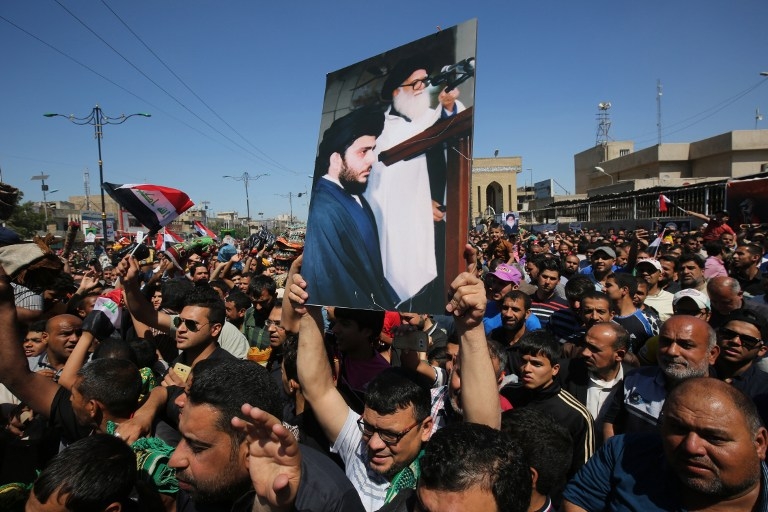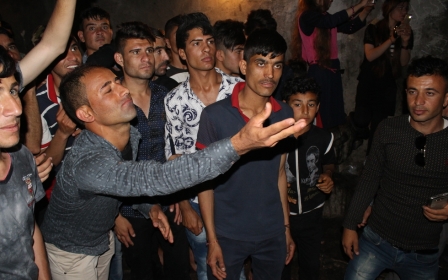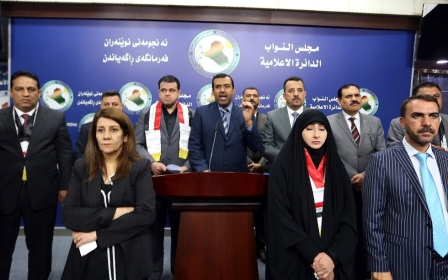Water bottles thrown in Iraqi parliament as thousands take to streets

Members of Iraq's parliament threw water bottles towards the country's prime minister and called for the speaker to quit on Tuesday, impeding a planned vote on a new cabinet lineup as thousands demonstrated for reforms nearby.
Iraq has been hit by weeks of political turmoil surrounding Prime Minister Haider al-Abadi's efforts to replace the cabinet of party-affiliated ministers with a government of so-called technocrats.
The proposed changes have been opposed by powerful political parties that rely on control of ministries for patronage and funds, and parliament has repeatedly failed to vote on a new cabinet list.
Abadi attended parliament on Tuesday, but MPs prevented him from speaking and threw water bottles in his direction, MPs and a parliamentary official who was present at the session said.
MPs also chanted against parliament speaker Salim al-Juburi, terming him "illegitimate" and saying: "Salim! Out, out!"
A new session was then held in another hall, the parliamentary official said, but the protesting MPs were barred from attending, meaning it is likely to be challenged.
Parliament has repeatedly been hit by chaos in recent weeks, with MPs holding an overnight sit-in at parliament, brawling in the chamber and seeking to sack Juburi, electing an interim replacement who has chaired his own sessions.
Abadi called a week ago for parliament to put aside its differences and do its job, but the antics in the legislature have continued.
As the latest political turmoil played out in parliament, thousands of protesters demonstrated for reforms nearby, answering a call from powerful Shia cleric Moqtada al-Sadr to do so.
The demonstrators, many carrying Iraqi flags, marched from Tahrir Square in central Baghdad to an entrance to the heavily fortified Green Zone where the government is headquartered, chanting that politicians "are all thieves".
The government "did not bring the country and Iraqis anything but poverty and killing," said demonstrator Abu Ali al-Zaidi, who travelled from Maysan province in the south for the protest.
"The political quotas and the parties that control everything are the reason for the failure of the government," said Abu Mohammed al-Sudani, a protester from Baghdad who carried an Iraqi flag.
Key government posts have for years been shared out based on political and sectarian quotas, a practice demonstrators have called to end.
Ali al-Bahadli, a cleric from the Sadr Movement who was taking part in the demonstration, said: "We want the ministers to be independent, outside the control of the political parties and parliament."
Sadr, the scion of a powerful clerical family who in earlier years raised a rebellion against US-led forces and commanded a feared militia, had called for a mass demonstration in Baghdad on Tuesday to pressure the government to carry out reforms.
He organised a two-week sit-in at entrances to the Green Zone last month, calling it off only after Abadi presented a list of cabinet nominees.
Abadi called in February for "fundamental" change to the cabinet so that it includes "professional and technocratic figures and academics".
That kicked off the latest chapter in a months-long saga of Abadi proposing various reforms that parties and politicians with interests in the existing system have sought to delay or undermine.
New MEE newsletter: Jerusalem Dispatch
Sign up to get the latest insights and analysis on Israel-Palestine, alongside Turkey Unpacked and other MEE newsletters
Middle East Eye delivers independent and unrivalled coverage and analysis of the Middle East, North Africa and beyond. To learn more about republishing this content and the associated fees, please fill out this form. More about MEE can be found here.




